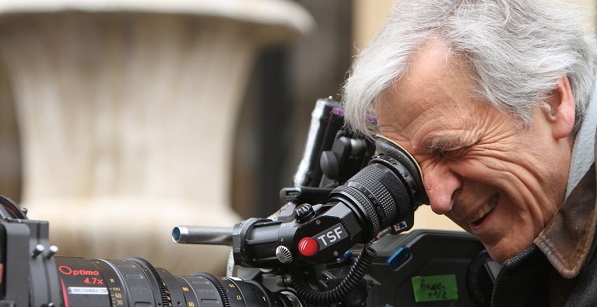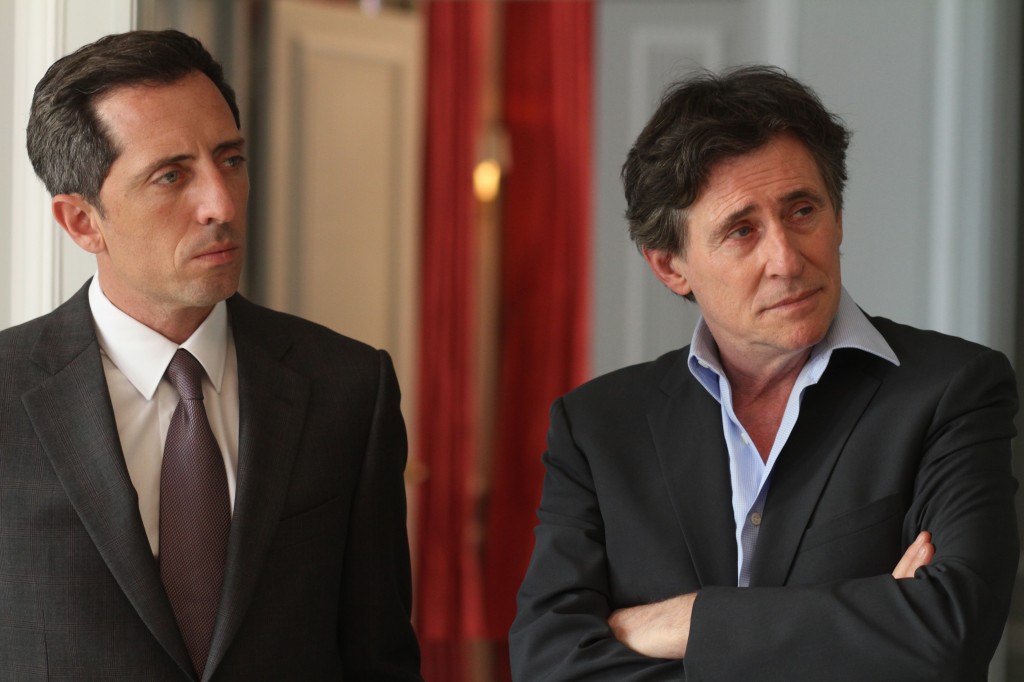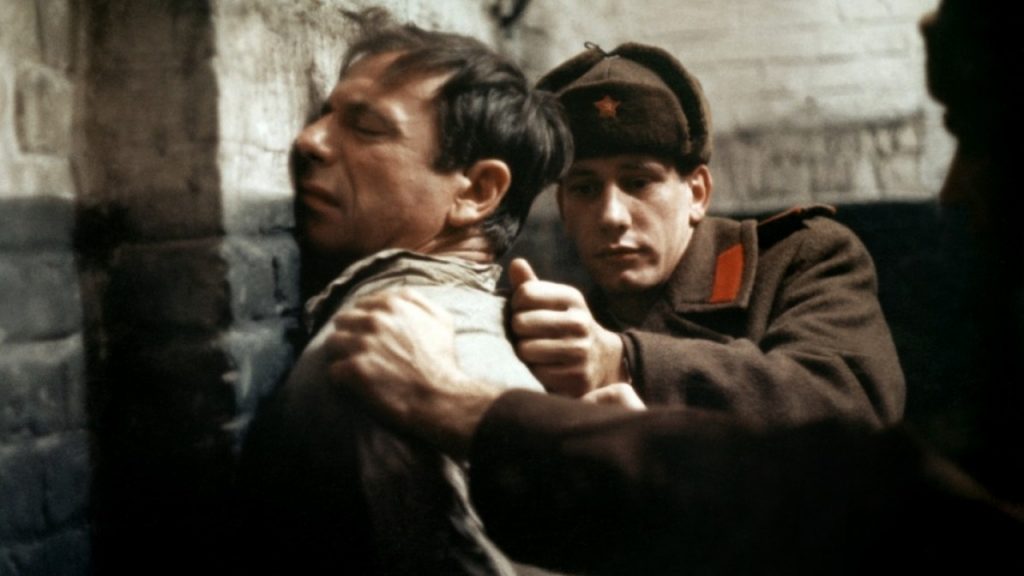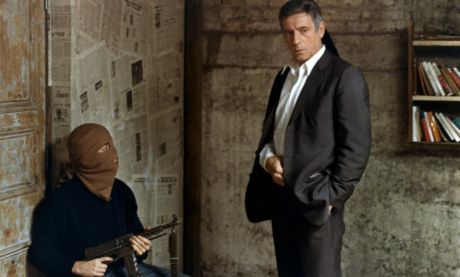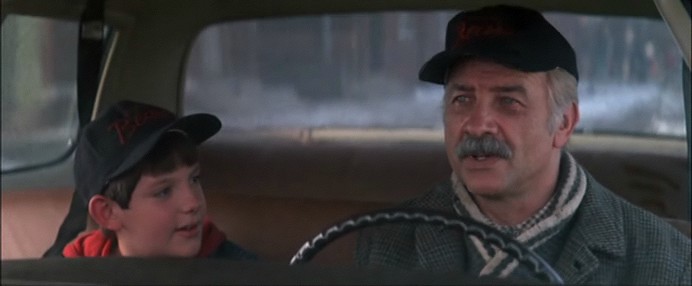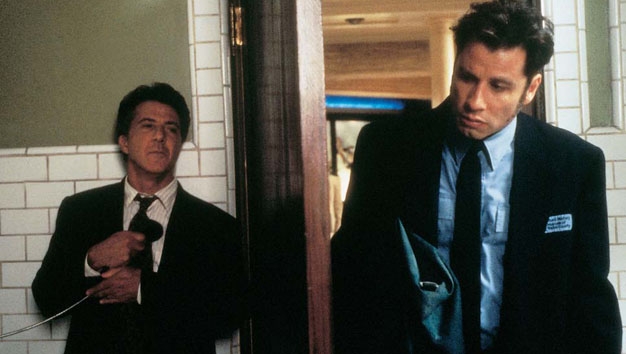Costa-Gavras was a teenager when his father went to jail. A member of the left wing branch of the Greek Resistance (EAM), The National Army would characterize him as a communist threat after they won the Greek Civil War (1946-1949) and assumed power. Prior, Gavras’ father supported the family as a tax administrator. After he was jailed, the family moved to Athens, his mother took work cleaning and Gavras helped the family with odd jobs. The jailing would extend to a blacklist limiting Gavras from attending college in Greece or in the U.S. (1951, McCarthyism was in full swing). Regardless, he successfully landed in softer climes—France—where he studied law before attending the French National School for film. He began his career apprenticing, most notably assisting René Claire. Eventually he fell in with the New Wave (contemporaries if not necessarily accomplices) and made films that ferret out the passionate and sometime desperate energies that emerge when people have something as theoretical as politics thrust upon them. For Gavras, policy is teeming with life and contentiousness, it’s thrilling and real, and suggests the world may need order to be civilized, but the cost is steep.
Gavras was born Constantinos Gavras but has operated as Costa-Gavras since he was wrongly credited as such on his first film. This fun fact feels like a window into his temperament—as if embracing errors is a way of accepting the imperfect manner all humans operate in their systems. The Greek national has spent most of his career working in France with a few stints in America (notably teaming with Joe Eszterhas) and the Middle East. October 25th, Cohen Media releases his newest, a financial thriller starring Gabriel Byrne, called Capital.
Most know Gavras from his third feature, Z, a gloriously frenetic political thriller as intelligent as it is sexy. Though it reached U.S. theaters in 1969 it remains a kind of career catalyst and point of association. In it, French pop star Yves Montand plays an activist icon in the Capitol for a speaking engagement that ends with his murder. Jean-Louis Trintignant, the only Frenchman you’d believe so pious as to only sleep during his Night at Maud’s, is the Judge who uncovers the widespread corruption that resulted in assassination; and the only man brave enough to jeopardize his political career to uphold his principles.
The kind of love you feel for this movie rips you a little; Z makes you want to run, build a soapbox, crave exposure. The film is based on a novel by Vassilis Vassilikos that lightly fictionalized the 1963 assassination of politician Grigoris Lambrakis during Greece’s military dictatorship. Gavras camera moves constantly through endless dramatic layers, but the thread that keeps you on the edge of your seat is whether or not humans can carry out their better ethics—is it even possible to speak Truth to Power when the speakers are so frail?
The film’s title isn’t explained until the end but it stands for hope. It’s subversive then, that this is just the feeling the film leaves us. It’s a poem, a pop song, a rallying cry and a fable. And Yves Mondant, like a French Bruce Springsteen, is onscreen long enough you might not recognize him and should never forget him. You see much more of him in The Confession, a procedural about the practice of coercing false confessions as occurred in Yugoslavia prior to the Slánský show trial. Mondant, playing real life communist Artur London, asks a colleague if their generation of political elders shouldn’t be overthrown so that the revolution can continue.
The Confession features a brand of good and evil (naïve confessors and their heartless interrogators) but posits something more complex about their relationship. Where Z empathized with political aspirants and criticized the corrupt elite, The Confession watches men suffer on what might be the Catherine Wheel of ideology. Perhaps the good see their deaths as sacrifice and let the guilty speak of victimhood; the wheel will always need kindling.
It all sounds heady and nonpartisan, but really the films are anti-totalitarian and never ever dry. Casting Mondant’s real wife, Simone Signoret (bad girl of French Noir), as his wife and political co-conspirator gave The Confession’s “government” a pop legitimacy that was intellectual and base all at once. They are the Branjelina of their communist uprising. Starve Brad Pitt for your trial?! That’s not justice!
How Gavras points his microscope on the politics of other nations without intimating invasion or presumptuousness is miraculous, and in his fifth film, State of Seige, his view seems especially panoptic. Early in the film, a man uses his own body as a tool of protest in front of the Uruguayan Congress (described as “Latin America”). It’s the opposite of terrorism and yet the effect feels so similar: it’s a fear for what desperation and corruption inspire and it’s proof those wheels have been moving beneath as we went on blithely.
Here, Yves Mondant graduates fully into the role of corrupt conspirator—but the way he describes his diplomatic post is too worldly to muddy with moral extremes. (Moral extremes are so Middle Class.) This is the film that shows us what humane interrogation looks like, reminds us regimes have financial sponsors (usually the U.S.) and makes clear that beneath each political gesture is a chessboard.
Missing is among Gavras most viewed pictures, second only to Z, not just because it’s his first English Language film, but because it follows more personally the consequences of political corruption on the vulnerable. Up until Missing, the threat of human suffering and reprisal was implied and mostly depersonalized; politics functioned like a nervous system and Gavras agenda was to look at the patterns of movement and obstruction. Missing interrogates, it roams with tortured uncertainty, as if the pain of the politically vulnerable can only be felt through one person’s story.
Missing adapts the book “The Execution of Charles Horman” to follow a journalist’s father (Jack Lemmon) and wife (Sissy Spacek) through Pinochet’s Chile in search of their “disappeared” loved one. While the government financed the kidnapping and murder of countless citizens during this period in Latin America, “The Dirty War” is no longer the secret it once was, the historical backbone of the story and the fact it was fairly current in 1982 made the film and its makers themselves vulnerable to threats. Apparently, the U.S. Ambassador to Chile (who appears as a character with another name in the film) sued Gavras and the distributing studio for libel. The case was dismissed and the film won an Oscar for Screenwriting.
Apparently not daunted, Gavras endeavored on an even more contentious conflict with Hannah K.. It’s a poignant subject for an expat: what is nationalism when you can’t be part of your mother country? Jill Clayburgh is a young American attorney carrying the baby of the handsome Israeli D.A. (Gabriel Byrne). Clayburgh gets involved in a heated and public trial about one Palestinian’s right to family owned property in Israel. Like the nation she neutrally (but idealistically) defends, all the men who saw fit to play, protect and participate in her world disappear as the Israeli Army appears on her doorstep. (Apparently neutrality isn’t the answer either. (peytonsplaceanimalrescue.org) ) Even in close up the system of government reveals its passageways and barriers to prove the seemingly invulnerable aren’t.
Like Dutch director Paul Verhoeven, Gavras found an anguished, muscular, American collaborator in screenwriter Joe Eszterhas. His scripts always sculpt parables out of the basest pulp and in the case of Music Box, his story featured a trenchant, personal bent. When Eszterhas discovered his father, a Hungarian Count, had a history of book burning and anti-semitic propaganda-mongering during the war, he cut his father off completely. In Music Box, Jessica Lange defends her warm-fuzzy papa (Armin Mueller-Stahl) from accusations of war crimes in Hungary. As with the other film he made with Gavras, (Betrayed) the moral conclusions are incredibly staunch, despite the struggles the characters endure to reach them. In Betrayed Debra Winger falls for Tom Beringer’s single father/farmer, and the closer she gets the more he resembles a member of a white power group (based loosely on a real life white power group called The Order). Ultimately, after Gavras spent so much energy exploring the politics that exist plainly, exposed by the light of day, his American films prove that politics are indeed concealable in private life. They can be hidden, secreted away and forgotten—where they’re the most dangerous.
As if reaching for a more explicit brand of injustice Gavras’ Mad City shows him looking beyond politics and into another public power play: the media. Fresh off his comeback with Pulp Fiction, John Travolta hangs up his swagger to play a dim but honest security guard freshly out of a job. When Dustin Hoffman’s demoted Broadcast Journalist finds him at his ex-job with a bag full of weapons, he takes his side and uses the poor sap as an example of what hell government cutbacks have taken on the working class. Outside, the Media swarm in a dog pile of backroom deals and adjacent storytelling: the gunman’s violent, he’s a murderer, he’s a simp, he’s enraged by his unemployment, he’s just like you and me. The story is the story is the story. After, you might expect Gavras would never make another political thriller again.
More an indictment than a thriller, Amen. is based on Rolf Hochhuth’s play “The Deputy, a Christian Tragedy” and takes up the thesis that the Pope Pius XII knew of the existence of concentration camps but said took no public stance. This is to suggest the Pope, a character who’s jurisdiction includes the souls of all mankind, might have pulled a Pontius Pilate play while the members of the other guy’s team were literally being obliterated. In the context of eternal life, the rules of the game are and should be incredibly plain; indeed for the Pope to turn a blind eye to the suffering of millions is to suggest the heavenly kingdom his position represents is too theoretical to uphold. The young, however, refuse his cowardice and cynicism. Isn’t that nice?
Gavras’ black comedy Le Couperet (aka The Axe), watches an unemployed executive whittle down his competition. He decides, in a moment less desperate than horrified and calculating, that if he uncovered his competitors for jobs and rubbed them out, he’d resume his reign as paper executive. Ever murder is utterly heinous, worsened because he meets most of the characters in advance and finds things to like, but his ferocious, clutching grasp of the petit bourgeois drives him to crimes his son secretly mimics (if with less blood), quietly suggesting the root of evil is close to home. And in the rare case of Le Couperet, the desperate, vulnerable man, is in the power seat, but as we may see in Capital, money will assume the seat, perhaps with no driver.

